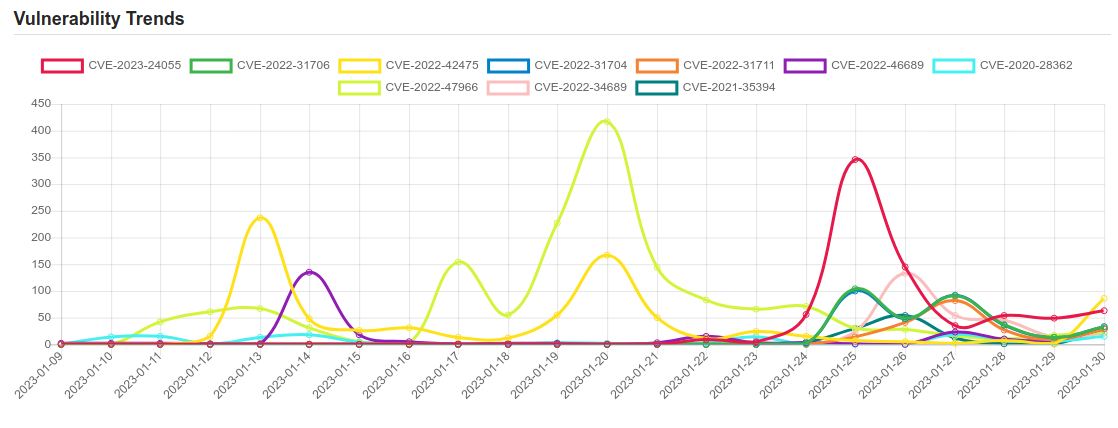Daily Vulnerability Trends: Tue Jan 31 2023

| CVE NAME | CVE Description |
| CVE-2021-35394 | Realtek Jungle SDK version v2.x up to v3.4.14B provides a diagnostic tool called ‘MP Daemon’ that is usually compiled as ‘UDPServer’ binary. The binary is affected by multiple memory corruption vulnerabilities and an arbitrary command injection vulnerability that can be exploited by remote unauthenticated attackers. |
| CVE-2022-25765 | The package pdfkit from 0.0.0 are vulnerable to Command Injection where the URL is not properly sanitized. |
| CVE-2022-27596 | A vulnerability has been reported to affect QNAP device running QuTS hero, QTS. If exploited, this vulnerability allows remote attackers to inject malicious code. We have already fixed this vulnerability in the following versions of QuTS hero, QTS: QuTS hero h5.0.1.2248 build 20221215 and later QTS 5.0.1.2234 build 20221201 and later |
| CVE-2023-23560 | In certain Lexmark products through 2023-01-12, SSRF can occur because of a lack of input validation. |
| CVE-2021-21551 | Dell dbutil_2_3.sys driver contains an insufficient access control vulnerability which may lead to escalation of privileges, denial of service, or information disclosure. Local authenticated user access is required. |
| CVE-2022-1388 | On F5 BIG-IP 16.1.x versions prior to 16.1.2.2, 15.1.x versions prior to 15.1.5.1, 14.1.x versions prior to 14.1.4.6, 13.1.x versions prior to 13.1.5, and all 12.1.x and 11.6.x versions, undisclosed requests may bypass iControl REST authentication. Note: Software versions which have reached End of Technical Support (EoTS) are not evaluated |
| CVE-2022-27925 | Zimbra Collaboration (aka ZCS) 8.8.15 and 9.0 has mboximport functionality that receives a ZIP archive and extracts files from it. An authenticated user with administrator rights has the ability to upload arbitrary files to the system, leading to directory traversal. |
| CVE-2022-3924 | This issue can affect BIND 9 resolvers with `stale-answer-enable yes;` that also make use of the option `stale-answer-client-timeout`, configured with a value greater than zero. If the resolver receives many queries that require recursion, there will be a corresponding increase in the number of clients that are waiting for recursion to complete. If there are sufficient clients already waiting when a new client query is received so that it is necessary to SERVFAIL the longest waiting client (see BIND 9 ARM `recursive-clients` limit and soft quota), then it is possible for a race to occur between providing a stale answer to this older client and sending an early timeout SERVFAIL, which may cause an assertion failure. This issue affects BIND 9 versions 9.16.12 through 9.16.36, 9.18.0 through 9.18.10, 9.19.0 through 9.19.8, and 9.16.12-S1 through 9.16.36-S1. |
| CVE-2022-23529 | ** REJECT ** DO NOT USE THIS CANDIDATE NUMBER. ConsultIDs: none. Reason: The issue is not a vulnerability. Notes: none. |
| CVE-2020-8958 | Guangzhou 1GE ONU V2801RW 1.9.1-181203 through 2.9.0-181024 and V2804RGW 1.9.1-181203 through 2.9.0-181024 devices allow remote attackers to execute arbitrary OS commands via shell metacharacters in the boaform/admin/formPing Dest IP Address field. |
| CVE-2022-34718 | Windows TCP/IP Remote Code Execution Vulnerability. |
| CVE-2023-24055 | ** DISPUTED ** KeePass through 2.53 (in a default installation) allows an attacker, who has write access to the XML configuration file, to obtain the cleartext passwords by adding an export trigger. NOTE: the vendor’s position is that the password database is not intended to be secure against an attacker who has that level of access to the local PC. |
| CVE-2022-31706 | The vRealize Log Insight contains a Directory Traversal Vulnerability. An unauthenticated, malicious actor can inject files into the operating system of an impacted appliance which can result in remote code execution. |
| CVE-2022-42475 | A heap-based buffer overflow vulnerability [CWE-122] in FortiOS SSL-VPN 7.2.0 through 7.2.2, 7.0.0 through 7.0.8, 6.4.0 through 6.4.10, 6.2.0 through 6.2.11, 6.0.15 and earlier and FortiProxy SSL-VPN 7.2.0 through 7.2.1, 7.0.7 and earlier may allow a remote unauthenticated attacker to execute arbitrary code or commands via specifically crafted requests. |
| CVE-2022-31704 | The vRealize Log Insight contains a broken access control vulnerability. An unauthenticated malicious actor can remotely inject code into sensitive files of an impacted appliance which can result in remote code execution. |
A considerable amount of time and effort goes into maintaining this website, creating backend automation and creating new features and content for you to make actionable intelligence decisions. Everyone that supports the site helps enable new functionality.
If you like the site, please support us on Patreon using the button below

To keep up to date follow us on the below channels.





![Cobalt Strike Beacon Detected - 166[.]88[.]2[.]184:80 7 Cobalt-Strike](https://www.redpacketsecurity.com/wp-content/uploads/2021/11/Cobalt-Strike-300x201.jpg)
